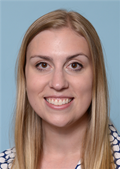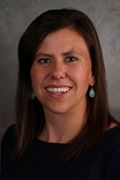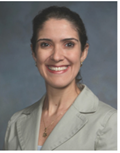Ashley Moeller, MD, Class of 2021
 What about your training at IU School of Medicine has best prepared you for a career as a child neurologist?
What about your training at IU School of Medicine has best prepared you for a career as a child neurologist?
My training from IU School of Medicine truly prepared me to be the best child neurologist that I can be. I was fortunate to be part of a program that is strong in all three areas of training: pediatrics, adult neurology and child neurology. Typically, there is one weak link, but that is definitely not the case at IU. I was treated like any other pediatrics resident during my first 2 years and was given a lot of responsibility in patient care. During my adult neurology year, I had incredible teachers and was able to hone my skills as a neurologist. In my child neurology years, I had the opportunity to work with every faculty member in our department to learn each of their perspectives and gain some of their subspecialty knowledge in order to become a well-rounded general child neurologist.
What sets the Department of Neurology apart from other programs in the country?
While probably cliché to say, I think the thing that most sets the IU School of Medicine Department of Neurology apart from other programs, besides the people, is the real focus on education. Faculty members enjoy teaching and choose to work at an academic center for that reason, first and foremost.
Our training is mostly through direct patient care, working one-on-one with attendings in clinics or managing patients in the hospital. There is also a good amount of protected lecture time. One unique educational experience at IU is our two-month neuroanatomy course. This is completed during our PGY4 year and is time set aside without clinic work to strictly learn and feel comfortable with neuroanatomy. It is an incredibly valuable two-month course and I appreciate the program making it a priority. The real evidence of the commitment to education though can be seen through the freedom we are given in choosing electives. We are able to follow any and all individual paths to explore areas of interest or areas in which we feel weak, so that we can get the best training possible. I used that time to work with our pediatric palliative care team, speech therapists, ophthalmologists, genetics specialists and more.
Amanda Croxton, DO, Class of 2017
 How did your residency training best prepare you for your career?
How did your residency training best prepare you for your career?
Both the pediatric and child neurology sides at Riley Hospital for Children are busy services with complicated and unique patients and the learning environment is very supportive of resident autonomy and education. This combination of complex and resident run has really allowed me to be prepared to face the challenge of caring for patients in my own practice. Additionally, when I had ideas of what I needed to learn and see to help shape my practice in the future, I was fully supported by staff to focus my learning and educational time to reach these goals.
What set the Department of Child Neurology apart from other programs in the country?
The people. The attendings and staff are incredible. Each attending is unique with so many different areas of knowledge, but they are all very passionate about child neurology and truly engaged in resident education. They encourage autonomy but provide tremendous support, and a collaborative learning and working environment. The residents and staff I worked with continue to shape the person and physician who I am even now. They are friends and colleagues, always a helpful support system for consults or just to listen. This is a group where you belong forever and that is pretty incredible.
What’s your favorite IU School of Medicine memory?
I have many favorites. From watching fireworks on the stairwell during the 4th of July overnight calls, to laughing through continuity clinic and all the challenges and rewards in between. IU and Riley Hospital were my home for 5 years and remains a home away from home. If given the option again, I would choose Riley every time.
Karen S. Carvalho, MD, Class of 2021
 What about your training at IU School of Medicine has best prepared you for a career as a child neurologist?
What about your training at IU School of Medicine has best prepared you for a career as a child neurologist?
My training from IU School of Medicine truly prepared me to be the best child neurologist that I can be. I was fortunate to be part of a program that is strong in all three areas of training: pediatrics, adult neurology and child neurology. Typically, there is one weak link, but that is definitely not the case at IU. I was treated like any other pediatrics resident during my first 2 years and was given a lot of responsibility in patient care. During my adult neurology year, I had incredible teachers and was able to hone my skills as a neurologist. In my child neurology years, I had the opportunity to work with every faculty member in our department to learn each of their perspectives and gain some of their subspecialty knowledge in order to become a well-rounded general child neurologist.
What sets the Department of Neurology apart from other programs in the country?
While probably cliché to say, I think the thing that most sets the IU Department of Neurology apart from other programs, besides the people, is the real focus on education. Faculty members enjoy teaching and choose to work at an academic center for that reason, first and foremost.
Our training is mostly through direct patient care, working one-on-one with attendings in clinics or managing patients in the hospital. There is also a good amount of protected lecture time. One unique educational experience at IU is our two-month neuroanatomy course. This is completed during our PGY4 year and is time set aside without clinic work to strictly learn and feel comfortable with neuroanatomy. It is an incredibly valuable two-month course and I appreciate the program making it a priority. The real evidence of the commitment to education though can be seen through the freedom we are given in choosing electives. We are able to follow any and all individual paths to explore areas of interest or areas in which we feel weak, so that we can get the best training possible. I used that time to work with our pediatric palliative care team, speech therapists, ophthalmologists, genetics specialists and more.